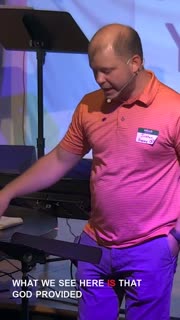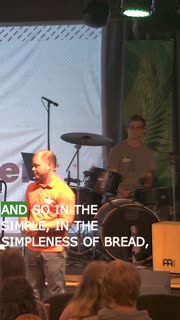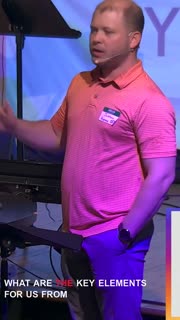God's Faithfulness: From Passover to Communion
Devotional
Sermon Summary
Bible Study Guide
Sermon Clips
1. "Who does God call? Seems like recently God calls old people but also God calls you too. In and where you are to do something. God spoke to Moses telling him to go back to Egypt to help free the Israelites from Pharaoh's grip. And God gave Moses the words to say Moses had a speech impediment but God gave him back his brother Aaron who helped him in speaking to Pharaoh what God was instructing him to do." [31:14] (35 seconds)
2. "What we see here is that God provided even in their despair, even in their unfaithfulness, even in having no trust in the one true God who has given to them over and over and over and provided for them over and over and over, they still had issue with looking to God for the full sustenance and substance that they need that they're calling and crying out to God for." [44:21] (31 seconds)
3. "We fail as humanity does. We fail at fully living into our callings, the movements of God, because we think we have a better way when in fact if we just allow the sustenance of God, the actual true sustenance from God, to be the gift from God that is given to us, to accept it as a gift from God given to us, it will be a lot easier to fulfill the callings that each and every one of us have to live a life in this God story and what a greater blessing it will be." [47:14] (59 seconds)
4. "And we skip many, many, many years now into who we are today as followers of Jesus Christ. And we see that in the last days of Jesus' life, Jesus is, as we understand, God incarnate, 100% human, 100% deity. The math doesn't make sense, but that's who God is. Not half God, fully God, in human form, walked this earth. And in his last days, his last days, he was offered as the ultimate sacrificial lamb to fulfill the forgiveness of sin for all of us." [51:38] (48 seconds)
5. "And so in the simple, in the simpleness of bread, in the simpleness of juice, the presence of God is with us. The presence of God's spirit is somehow swirling among us. It's, as odd as that may sound, God's spirit is present in this room tonight. And most importantly, God's presence is within this meal for us tonight. It's a meal on this table that is open to every person that has entered these doors." [54:43] (44 seconds)
6. "When we cry out to God, when we are looking for the help from God, when we are trying to listen for God, are we really wanting to listen and take an answer from God? Are we really wanting God's help? The people here that have followed Moses and the Moses that God has called to bring God's people out of slavery, did they really want help from God? Did they really want to listen to instruction from God?" [42:58] (37 seconds)
7. "God calls every single one of us in some way to do something for the building of God's kingdom. Why did God call Moses? If we kind of go back a little bit we understand Moses figures out his identity as a Hebrew right? And then this is just some imagery of some plagues happening, right? So he figures out his identity as a Hebrew so he kills one of the slave masters. He jets off fifty years later when the man's in his eighties he goes back. God calls him back to Egypt to tell Pharaoh to let God's people go." [30:06] (48 seconds)
8. "What are the key elements for us from this passage, us as a part of the story of God and us moving forward living out and living within the story of God? First off, when we sort of talked about this in the last several weeks, when we cry out to God, when we are looking for the help from God, when we are trying to listen for God, are we really wanting to listen and take an answer from God? Are we really wanting God's help?" [42:58] (34 seconds)
9. "And then those families, the Hebrew people, then left Egypt. And we skip many, many, many years now into who we are today as followers of Jesus Christ. And we see that in the last days of Jesus' life, Jesus is, as we understand, God incarnate, 100% human, 100% deity. The math doesn't make sense, but that's who God is. Not half God, fully God, in human form, walked this earth. And in his last days, his last days, he was offered as the ultimate sacrificial lamb to fulfill the forgiveness of sin for all of us." [51:38] (54 seconds)
10. "And so in the simple, in the simpleness of bread, in the simpleness of juice, the presence of God is with us. The presence of God's spirit is somehow swirling among us. It's, as odd as that may sound, God's spirit is present in this room tonight. And most importantly, God's presence is within this meal for us tonight. It's a meal on this table that is open to every person that has entered these doors." [54:43] (44 seconds)
Ask a question about this sermon
2. "What we see here is that God provided even in their despair, even in their unfaithfulness, even in having no trust in the one true God who has given to them over and over and over and provided for them over and over and over, they still had issue with looking to God for the full sustenance and substance that they need that they're calling and crying out to God for." [44:21] (31 seconds)
3. "We fail as humanity does. We fail at fully living into our callings, the movements of God, because we think we have a better way when in fact if we just allow the sustenance of God, the actual true sustenance from God, to be the gift from God that is given to us, to accept it as a gift from God given to us, it will be a lot easier to fulfill the callings that each and every one of us have to live a life in this God story and what a greater blessing it will be." [47:14] (59 seconds)
4. "And we skip many, many, many years now into who we are today as followers of Jesus Christ. And we see that in the last days of Jesus' life, Jesus is, as we understand, God incarnate, 100% human, 100% deity. The math doesn't make sense, but that's who God is. Not half God, fully God, in human form, walked this earth. And in his last days, his last days, he was offered as the ultimate sacrificial lamb to fulfill the forgiveness of sin for all of us." [51:38] (48 seconds)
5. "And so in the simple, in the simpleness of bread, in the simpleness of juice, the presence of God is with us. The presence of God's spirit is somehow swirling among us. It's, as odd as that may sound, God's spirit is present in this room tonight. And most importantly, God's presence is within this meal for us tonight. It's a meal on this table that is open to every person that has entered these doors." [54:43] (44 seconds)
6. "When we cry out to God, when we are looking for the help from God, when we are trying to listen for God, are we really wanting to listen and take an answer from God? Are we really wanting God's help? The people here that have followed Moses and the Moses that God has called to bring God's people out of slavery, did they really want help from God? Did they really want to listen to instruction from God?" [42:58] (37 seconds)
7. "God calls every single one of us in some way to do something for the building of God's kingdom. Why did God call Moses? If we kind of go back a little bit we understand Moses figures out his identity as a Hebrew right? And then this is just some imagery of some plagues happening, right? So he figures out his identity as a Hebrew so he kills one of the slave masters. He jets off fifty years later when the man's in his eighties he goes back. God calls him back to Egypt to tell Pharaoh to let God's people go." [30:06] (48 seconds)
8. "What are the key elements for us from this passage, us as a part of the story of God and us moving forward living out and living within the story of God? First off, when we sort of talked about this in the last several weeks, when we cry out to God, when we are looking for the help from God, when we are trying to listen for God, are we really wanting to listen and take an answer from God? Are we really wanting God's help?" [42:58] (34 seconds)
9. "And then those families, the Hebrew people, then left Egypt. And we skip many, many, many years now into who we are today as followers of Jesus Christ. And we see that in the last days of Jesus' life, Jesus is, as we understand, God incarnate, 100% human, 100% deity. The math doesn't make sense, but that's who God is. Not half God, fully God, in human form, walked this earth. And in his last days, his last days, he was offered as the ultimate sacrificial lamb to fulfill the forgiveness of sin for all of us." [51:38] (54 seconds)
10. "And so in the simple, in the simpleness of bread, in the simpleness of juice, the presence of God is with us. The presence of God's spirit is somehow swirling among us. It's, as odd as that may sound, God's spirit is present in this room tonight. And most importantly, God's presence is within this meal for us tonight. It's a meal on this table that is open to every person that has entered these doors." [54:43] (44 seconds)










